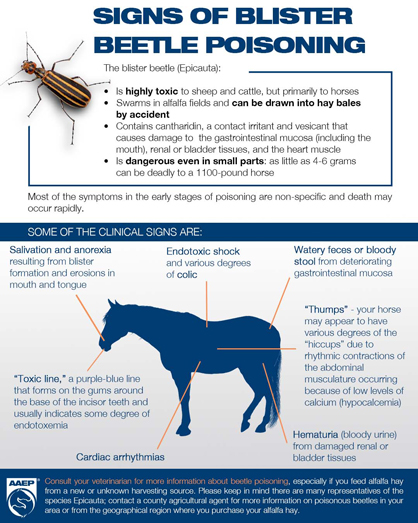Blister Beetle Poisoning
By Benjamin Espy, DVM, DACT
Many horse owners feed alfalfa hay to supplement their horse and is a very efficient source of protein and calcium. Alfalfa hay requires very specific growing conditions and is primarily harvested in the western United States. Even if you are using alfalfa that has been harvested months or years previously, your horse is still at risk for blister beetle toxicity.
The blister beetle (Epicauta) is highly toxic to sheep and cattle, but primarily to horses. As little as four (4) to six (6) grams of blister beetles can be deadly to an 1100 lb. horse. Blister beetles swarm in alfalfa fields and are drawn into bales by accident. Even small parts of these beetles are toxic to a horse. Whole insects need not be present to be dangerous.
Cantharidin is the chemical found in blister beetles that causes the damage noticed by the owner and veterinarian. It is a contact irritant and a vesicant (causes blister formation). The tissues most often affected by cantharidin are gastrointestinal mucosa (including the mouth), renal or bladder and the heart muscle. Although this may seem simple enough, most of the symptoms in the early stages of poisoning are non-specific and death may occur rapidly. Some of the clinical signs that may occur are as follows:
* Endotoxic shock and various degrees of colic – Usually results from mucosal damage and from the migration of normal intestinal bacteria.
* Salivation and anorexia – Results from vesicle (blister) formation and erosions in mouth and tongue.
* “Toxic Line” – Indicates a purple-blue line that forms on the gums around the base of the incisor teeth. This usually indicates some degree of endotoxemia.
* Watery feces or bloody stool – From abraded and deteriorating gastrointestinal mucosa.
* Cardiac arrhythmias – Occur most often from electrolyte abnormalities (or hypocalcemia) or damage to the heart muscle itself (myocardium).
* Hematuria (bloody urine) – Evidence of renal damage or may be from ureter, bladder or urethral mucosa damage.
* “Thumps” – This is a curious syndrome unique in the horse. It is also called synchronous diaphragmatic flutter. It is seen as rhythmic contractions of the abdominal musculature. It occurs because of hypocalcemia and your horse may appear to have various degrees of the “hiccups.”
* Bloodwork your veterinarian will run may reveal low levels of magnesium (hypomagnesemia) and calcium (hypocalcemia).
* Increased packed cell volume (PCV) and protein levels in the blood will indicate dehydration.
* Increased blood urea nitrogen and creatinine indicate renal damage and dehydration.
Depending on what stage of the syndrome your horse is in, your veterinarian may observe a transient, or short-lived, hyperglycemia. There is no antidote for cantharidin. The only treatment your veterinarian can provide is supportive. Intravenous fluids with or without calcium are indicated to combat dehydration. Activated charcoal and mineral oil may be administered through a nasogastric tube by your veterinarian to help evacuate toxins from the gastrointestinal tract and delay potential absorption. Gastric protectants may decrease gastrointestinal discomfort and colic. Antibiotics are mainly prophylactic (preventive).
Ask your veterinarian about this extremely deadly disease, especially if you feed alfalfa hay from a new or unknown harvesting source. Since there are many representatives of the species Epicauta, your county agricultural agent may be able to provide you with pictures or pamphlets of poisonous beetles in your area or from the geographical are where you purchase your alfalfa hay.
Reviewed by original author in 2016.
Visit the American Association of Equine Practitioners (AAEP): Blister Beetle Poisoning | AAEP











